- Home
- James A. Michener
Caribbean Page 3
Caribbean Read online
Page 3
‘Tiwánee!’ he shouted. ‘Don’t be foolish!’ but despite his pleading she dipped a finger into the altered substance and gingerly brought it to her mouth. As she had expected, that first exploratory taste was reassuring: salty, sharp, with an invitation to try more, which she did, without apparent danger to herself. In succeeding days she kept tasting her brew, finding it increasingly good, and at last, without advising her husband of the bold step she was about to take, she gulped down such a generous amount of her new substance that had it been the original poison, she would surely have died. She didn’t. In fact, she felt extremely well, and after two days had passed without ill effect she told Bakámu: ‘It’s safe and tastes good.’
Soon all the women in the village were keeping pots of the once-poisonous liquor quietly bubbling at the back of their fires and tossing into the brew bits of vegetable and fish and even agouti meat on the rare occasions when one of those succulent little animals was caught. When sharp and biting peppers were added to the mixture, a fine, tasty and nourishing stew resulted, all thanks to Tiwánee, who by popular acclaim became the seer of the community, not in competition with the old shaman who propitiated the spirits but as the protector of the hearth where men and women were fed and revived.
When this accolade was bestowed upon her, she became a changed woman. She grew noticeably wiser, as if powers long dormant were suddenly codified and whipped into shape, as if knowledge which she had been quietly accumulating mysteriously blossomed to produce new and totally unexpected fruit, and she was recognized as a leader. Throughout the known world this miracle was duplicated: an ordinary man or woman would be elected to some office, and during the conduct of its business would mysteriously become able enough to discharge the duties of that office, so that in the end someone who might originally have been a rather common person developed into a genius.
Having undergone such a metamorphosis, Tiwánee now found little pleasure in her exalted position, for although she was pleased that she had brought her village wise leadership, she realized that with her new position came new responsibilities, and she continued to brood about the possible dangers that might ensue if strangers had indeed settled upon the opposite side of her island.
One of her duties as a leader in the village was to make the decision as to when it was time to plant the manioc. But because this was of such extreme importance to the village, a matter of life and death, that decision could not be left to her alone; responsibility was shared with the old shaman whose counsel had kept the spirits of the other world favorably inclined toward this village. Fortunately, Tiwánee and the old man cooperated easily, he taking charge of all in the other world, she of the sun, the rainfall and the coming of summer in this, and between them they kept the manioc maturing just when it was most needed. Had they in any way been at odds, their people would have suffered, and they knew it.
On a propitious day before the very hot spell arrived with its threat of hurricanes, the two protectors of the village agreed that the time had come when manioc cuttings should be planted, and as soon as the shaman cried: ‘The planting can begin!’ Bakámu took over the leadership of everything. Dashing along the waterfront, he shouted joyously: ‘Ball game! To celebrate the manioc!” and everyone hastened to the flat playing field whose boundaries were defined by large boulders with flattish faces planted like an informal wall around the edges of a rectangular field with clearly marked goal lines at each far end. Mysteriously, these ball courts of the ancient Arawaks and their cousins the Maya to the west were similar in size to the fields that Europeans and Americans centuries later would choose for their soccer, football, rugby and lacrosse fields, some eighty yards long by thirty wide, as if some inner measuring system of the human body had cried through all the centuries: ‘A man can run, when others are hammering at him, about this far and no farther,’ and the fields in all these heavy sports conformed to these dimensions.
The one at Bakámu’s village was located on a majestic spot parallel to the seashore, so carefully oriented that neither team would enjoy any advantage from the changing positions of the sun. It was a splendid green field, with grass chopped low and protected to the east by mountains clothed in purple. It had witnessed games of great excitement and notable performance, games that lived in memory, and some of the best had occurred at times like this, when the entire village came out to celebrate the replenishment of human life. In this village, at least, the great ball game was a thing of zest and wild cheering and victory for everyone, even the vanquished, who knew they had suffered defeat in a joyous cause.
The game required a large rubber ball, but the islands had no rubber trees, and communication between them by canoe was almost unheard of, except for Bakámu’s tentative explorations north and south. Rubber trees grew only in the jungles on lands of continental magnitude, but yet rubber balls on which the near-religious sport of the region depended did circulate even to the most remote islands. It was as if these Arawaks knew what was important in their lives and cherished as national treasures any rubber balls which came their way. At any rate, this village had had a series of such balls, each arriving as its predecessor was about to expire, and each was kept in the protection of the shaman, for it was a treasure beyond mere value: it was almost the soul of the village, for without it the wild games could not proceed, and in their absence the manioc plants might die, and the people, too.
In Bakámu’s village the game was played by two teams of four men each; in other villages with somewhat larger fields there might be as many as six, but on this smaller field four seemed about right. Each team had a goal to defend, but every member was free to roam the entire field, so long as he was always ready to scamper back to defend his own goal. The aim was to drive the ball across the other team’s goal line, and whenever play approached one of the goals, the screams of the spectators lining the fields grew intense.
Hands could not be used. If one touched the ball, the player was sent to the sidelines, for the ball must be struck primarily off the shoulder or the hip; not even elbows could be used, nor heads nor heels, but even under these limitations the players became wonderfully adept in moving the ball around. Since the strategies of the game demanded that players be prepared to throw themselves on the ground to obstruct opponents or dive for the ball, men wore knee and elbow guards, always on the right joints, but the captain of each team wore in addition a remarkable piece of equipment. It was a huge stone ring, unbroken in its circle but with an opening just wide enough for him to step into it, then bring it up over his knees and wide hips until it rested easily about his middle. Since it weighed twenty-four pounds, it gave extraordinary power when he struck the ball either with it directly or with his weighted hip.
When the teams lined up, the two captains, each with a stone circle about his waist, obviously located themselves as goalkeepers, sending any ball which came their way far back in the opposite direction with a tremendous blow.
On this day of special significance the spectators crowded the platforms behind the two goals and lined the spaces between the big upright stones. Flowers festooned the perimeters of the field, and boys with drums made a lively racket. In the interval before the game started, women sang and men danced stately measures intended to placate the spirits who determined the growth of manioc. When the excitement was at its height, an older man serving as a referee sounded a horn made from a big conch shell, the revelers cleared the field, and the play began.
Deftly tossing the rubber ball so that it bounced between two opposing players in the middle of the field, the referee started the game, and the movements of the two men were so brilliant, one striking the ball with his hip, the other rejecting it with his shoulder, that the game got off to a noisy start. Back and forth the ball sped, with the two goal tenders sending it down the field whenever it came their way, but the most exciting moments came when some daring player in midfield threw himself with abandon onto the hard earth, skidded along on his protecting pads, and gave the ball a sharp thrust with either shoulder or hip. Then the crowd roared.
As the game progressed, it looked as if Bakámu’s team would be defeated, because for each time his team had a shot at the far goal, the other team had three or four at his. But he was so agile that he deflected them when the situation looked least promising, and thus kept his team in the game.
Then, suddenly, he took one enemy shot on his hip, struck it with his big stone girdle, and sent it adroitly into the face of one of the standing stones, from which it reflected in such a way that he was in the right spot to give it another shot onto the face of another upright. In this remarkable manner Bakámu ricocheted the ball five times from stone to stone until he had it clear down the field, where, with a mighty swing of his heavy girdle, he smashed it home for a score.
It had been a prodigious feat, a one-man gallop through the entire opposition made possible only by the exquisite skill with which he used those upright stones for his carom shots. There could not have been many young men in the world that day who could have duplicated his amazing combination of agility, skill, precision and endurance, and when he completed his tour de force, the crowd broke into ecstatic cheers, with the old shaman coming down onto the court to congratulate him: ‘This year the manioc will grow.’
In the ancient days among the Arawaks, at such a moment of triumph it was customary for the captain of the losing team, the guardian of the far goal with his own heavy stone belt at his waist, to be decapitated and his blood to be scattered over the playing area to ensure that the grass there would remain green for the next ritual game, but after some centuries of such sacrifices the practical-minded Arawaks had reasoned among themselves: ‘Isn’t it rather ridiculous and lacking in profit to kill off each planting season the second-best player we have?’ And when it was found further that grass outside the playing area grew just as green without the constant application of human blood, it was decided to halt the decapitations. Henceforth, the losing captain bore the pain of having lost an important game but not the greater pain of losing his head, and everyone in the village applauded the new rule, for it was certainly more sensible in that they preserved good players for later games.
However, there was a shaman, in the year when the sacrifices following the games ended, who was a powerful man who had the welfare of his community at heart, and whereas he was more or less forced to approve the cessation of decapitations after games, he insisted that the bloody ritual continue on the eve of the winter solstice, that tremulous day when the sun reached its farthest dip to the south, leaving the world uncertain whether it would ever return north to bring its bounty with it: ‘We must sacrifice something precious to the sun to lure it back. That’s obligatory.’
But Tiwánee’s great-great-grandmother many generations back had been a woman of powerful reasoning, and she argued: ‘Some say we must behead people to solve two important problems. To ensure the growth of manioc and to ensure that the sun comes back. Sometimes manioc does not grow well, so maybe sacrifice is needed to make the choice. But there has never been a time when the sun did not come back, so maybe that sacrifice is unnecessary. Then again, we’ve already proved that manioc can grow whether there’s sacrifice or not—even if you do sacrifice and it doesn’t rain, no manioc—so why continue sacrificing good men when we know the sun always comes back?’
She carried the day, whereupon the outraged shaman predicted that she would die within the year that the sun sacrifice ended—but she lived for another sixty.
So this year the glorious day of the ball game in honor of manioc ended in near-perfection. After Bakámu’s unparalleled feat of bouncing the ball five times against the upright slabs and catching it each time on a dead run, two more games were played, with Bakámu’s side winning two goals to one. A feast ensued, at which Tiwánee supervised the distribution of cassava cakes and small bowls of her pepper-pot stew made from what had once been poison. There was dancing, and lovemaking for the young, and singing far into the night. These eminently practical people who had long ago dispensed with human sacrifice loved the joyousness of living. They revered the wonderful mysteries that came with the setting of a blood-red sun and the ending of a perfect game and the soft approach of night with its own triumphs, like the golden moon which rose to irradiate the beach and the sea and the watching mountains.
The day of the game there was another spectator—hiding in the mountains behind the town and watching with increasing bewilderment all that unfolded on the plain beside the sea. It was Karúku the Carib, and what his dark, scowling eyes beheld astounded him: Grown men playing a game! No warriors anywhere. No barriers protecting the approaches to the village. Everyone seems to be in attendance, but I see no weapons of any kind. The men in the game look strong, but even they carry no weapons that I can see. What is this?
It was incomprehensible to him that men of fighting age should not be constantly ready to fight and that a village with obvious advantages had taken no steps to protect itself from possible invaders: What kind of people are they, down there? No army? No weapons? No defenses? What do they think life is? And he reached the only conclusion that concerned him: Properly led, my men could capture that village and everyone in it without the loss of a man. And then he ticked off on the fingers of his left hand the unprotected booty that awaited him: Women for breeding. Boys for fattening. Men for feasting. And as the sun set over the peaceful and even benevolent scene he smiled grimly, and started planning how to prepare his people for the task that confronted them, a task of extreme simplicity, it seemed to him.
When Karúku returned to his temporary ill-constructed village on the Atlantic shoreline north of the cliffs, he shared with his people the results of his spying, and with cunning and skill outlined a clever three-pronged assault on the unsuspecting village: ‘I’ll lead my men in from the north and make a noise. But then you, Narivet, make a big attack in the middle, and when they’re confused, running this way and that, Ukalé from the south will start the real assault. I’ll wait till they run to that side, then I’ll rush in, no stopping, and kill them from the rear.’
Three times he drilled his cadres, arranging signals and making it clear that he intended his men to sweep forward into the center of the village regardless of what belated defensive steps the Arawaks might take: ‘If any man on our side falls back, he is dead. Even if they start fires to hamper us, we run right through them. Everyone!’ And he indicated by the fury with which he spoke that he included himself in that command.
During the third rehearsal he carried in his right hand the wand of office. It was a long bludgeon fashioned from a very hard gray-green wood into which had been imbedded with a powerful forest gum sharp slivers of rock and conch shell, so that no matter from what direction the club came, it tore any flesh it struck and thrust into the wound the manioc poison that tipped the sharp cutting edges. It was a dreadful instrument and an appropriate treasure for the Caribs, for they had brought with them in their canoes from the Orinoco no household deities or ancient treasures which defined the tribe, but only this dreadful war club which had been perfected into a superb tool for killing. It symbolized the difference between the two peoples: the Arawaks treasured the golden conch shell as the source of tools and adornments for their women, the Caribs for the lethal spikes it gave their clubs; the Arawaks had adapted manioc liquid to enhance their food, the Caribs used it as a fatal poison against enemies; the Arawaks had a rubber ball as their totem, the Caribs this murderous club. But most significant, the Arawaks had progressed to the point in civilization in which they respected, defended and adored women, while the Caribs treated them only as beasts of burden and breeders of new warriors. The impending struggle between these two contrasting groups was bound to be unequal, for in the short run brutality always wins; it takes longer for amity to prevail.
This first battle would foreshadow many more that would scar the islands of this beautiful sea. In far western reaches, brutal warriors from central Mexico would crush the kindlier civilizations of the Maya. Exploring newcomers from Spain would decimate the peaceful Indians they found. Englishmen on far western Barbados would harry peaceful cargo ships and put all to the sword. And in island after island white owners would treat black slaves with a sickening barbarity. The assault of the warlike Caribs upon the peaceful Arawaks was merely the first in an unbroken chain of brutalities.
On the day of attack the Caribs struck according to plan, with the first group under Karúku rushing in from the north and making a considerable clamor, which drew the frightened Arawaks to that quarter to protect their village. But when they ran in that direction, the second group of Carib warriors rushed toward the middle with even greater noise, and all became confusion.
Then the third contingent, brandishing war clubs and shouting wildly, swept in from the south, and any defense of the village collapsed. But Karúku’s victory was not going to be as uncontested as he had hoped, for in the final moments of the attack, the big man he had watched admiringly in the game, the one with the stone belt about his waist, summoned young men who had been on his team, and these four, joined by men from the team that had lost, gathered at the playing court on which they had performed so well, and there, with sticks and improvised clubs, defended themselves as good athletes would.
Led by Bakámu’s fierce determination and encouraged by his shouts, they gave such a strong account of themselves that they drove some of the attackers from the fight, an event which infuriated Karúku, who directed four of his men to seize Bakámu and immobilize him. When this was done, at great risk to the assailants who felt the power of the Arawak’s resistance, Karúku rushed up, spat in the face of the prisoner whose arms were pinioned, then swung his deadly club in full circle over his head and brought it down with bone-crushing force on Bakámu’s skull, killing him on the spot.

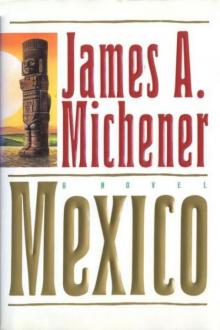 Mexico
Mexico The World Is My Home: A Memoir
The World Is My Home: A Memoir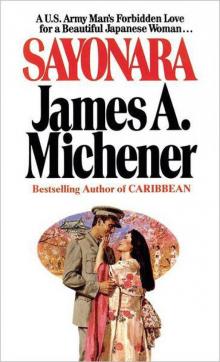 Sayonara
Sayonara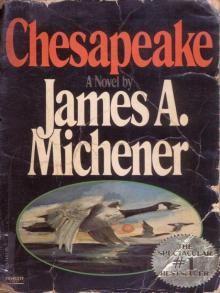 Chesapeake
Chesapeake The Novel
The Novel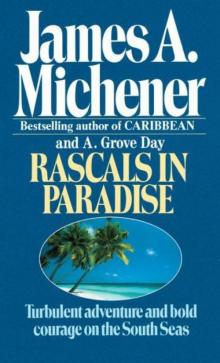 Rascals in Paradise
Rascals in Paradise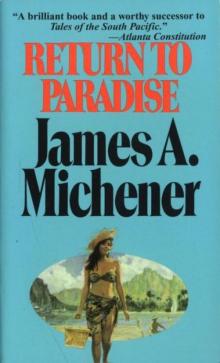 Return to Paradise
Return to Paradise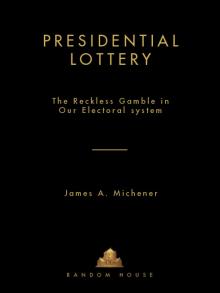 Presidential Lottery: The Reckless Gamble in Our Electoral System
Presidential Lottery: The Reckless Gamble in Our Electoral System The Source
The Source Poland
Poland Space
Space Caravans
Caravans Creatures of the Kingdom: Stories of Animals and Nature
Creatures of the Kingdom: Stories of Animals and Nature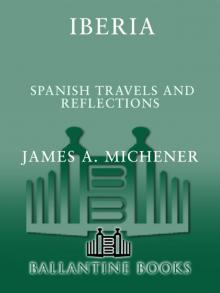 Iberia
Iberia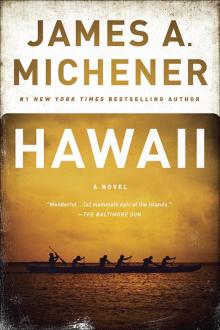 Hawaii
Hawaii The Watermen: Selections From Chesapeake
The Watermen: Selections From Chesapeake Report of the County Chairman
Report of the County Chairman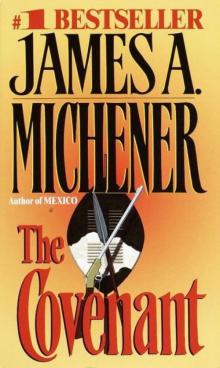 The Covenant
The Covenant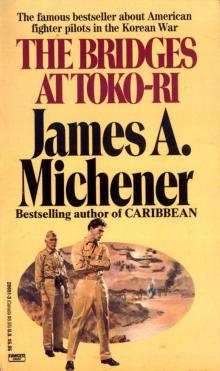 The Bridges at Toko-ri
The Bridges at Toko-ri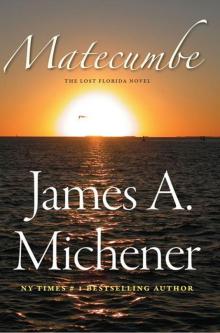 Matecumbe
Matecumbe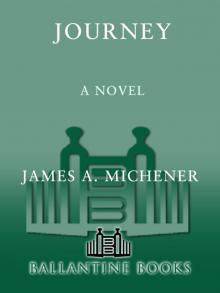 Journey: A Novel
Journey: A Novel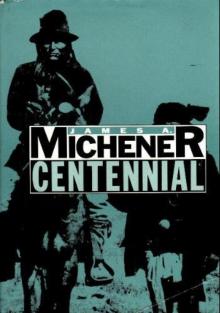 Centennial
Centennial Sports in America
Sports in America Texas
Texas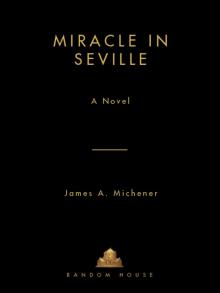 Miracle in Seville
Miracle in Seville This Noble Land: My Vision for America
This Noble Land: My Vision for America Tales of the South Pacific
Tales of the South Pacific Bridges at Toko-Ri
Bridges at Toko-Ri Space: A Novel
Space: A Novel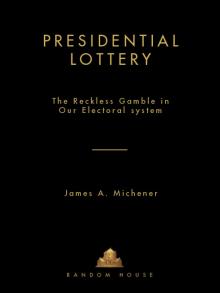 Presidential Lottery
Presidential Lottery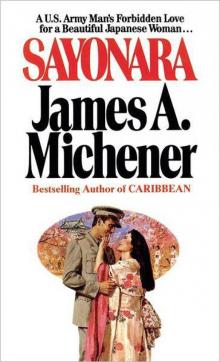 Sayonara: A Novel
Sayonara: A Novel This Noble Land
This Noble Land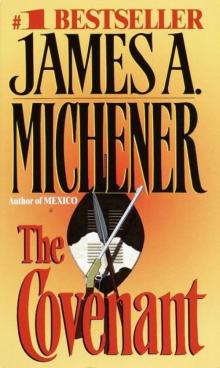 The Covenant: A Novel
The Covenant: A Novel Miracle in Seville: A Novel
Miracle in Seville: A Novel The Bridge at Andau
The Bridge at Andau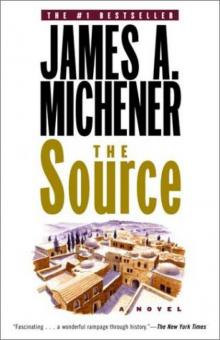 Source
Source The Source: A Novel
The Source: A Novel Journey
Journey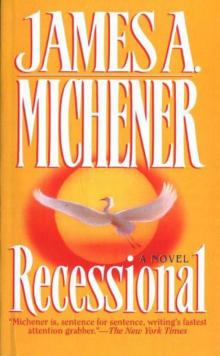 Recessional: A Novel
Recessional: A Novel Legacy: A Novel
Legacy: A Novel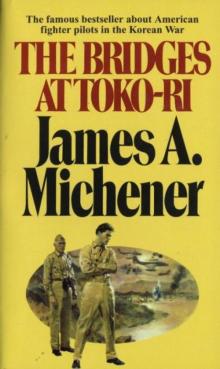 The Bridges at Toko-Ri: A Novel
The Bridges at Toko-Ri: A Novel Poland: A Novel
Poland: A Novel